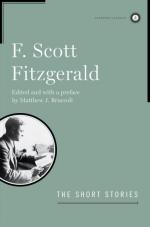|
This section contains 7,339 words (approx. 25 pages at 300 words per page) |

|
SOURCE: Balkun, Mary McAleer. “‘One Cannot Both Spend and Have’: The Economics of Gender in Fitzgerald's Josephine Stories.” In F. Scott Fitzgerald in the Twenty-First Century, edited by Jackson R. Bryer, Ruth Prigozy, and Milton R. Stern, pp. 121-38. Tuscaloosa: The University of Alabama Press, 2003.
In the following essay, Balkun views the theme of emotional bankruptcy as central to Fitzgerald's Josephine stories.
It has long been a given that the idea of emotional bankruptcy is one of F. Scott Fitzgerald's central themes. However, critics have tended to focus upon the “emotional” aspect of the equation, the protagonist's eventual inability to feel and experience fully, rather than to consider the economic implications of the expression.1 A “bankrupt” is one who no longer has the means for exchange, one who has overextended him- or herself. The language of the marketplace—trade, value, profit, and loss—is also the language of...
|
This section contains 7,339 words (approx. 25 pages at 300 words per page) |

|


